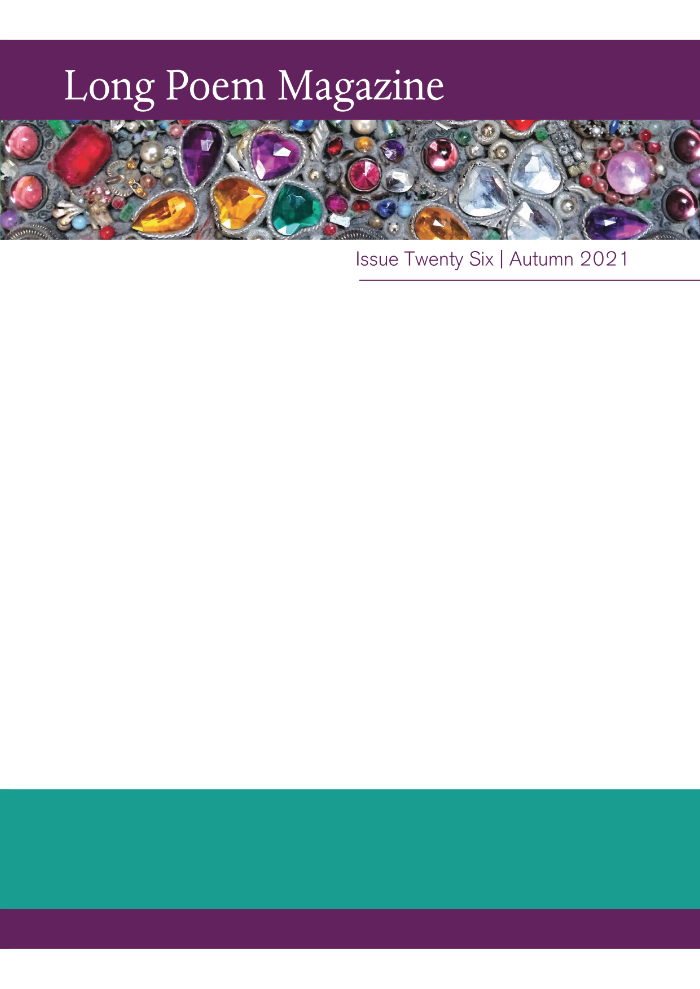Writing a long poem must always involve a balance between exploration – of new layers of detail and meaning – and return to the theme. It is a dance between expansion and concentration. This practice suggests a fugue, the musical practice of building part after part of a piece, as well as the psychological fugue state of disassociation and dislocation. Tim Liardet’s introduction to his poem ‘Haptic Fugue’ explains: ‘[I] wanted to explore confusion and extreme disruption in relation to striving for structure, order and music.’
In this issue, there are many examples of poetic fugues. Fugue can be a state of flight – from a central subject, from one’s identity. It can also be the circling of a hub of meaning. Hannah Bramness’ poem ‘The Water Glass’ (translated by Anna Reckin) defines ‘the water glass [as] a prism through which both the past and the beyond (perhaps) can be seen’; this stanza focuses both the far and near:
We are out rowing, gliding further with each stroke, approaching
the unseen edge of the glass. Bubbles rising up from below, the echo of
waves beating back, reverberations, all these can be heard through
the strokes of the oars, the beat of our hearts.
Musical fugues allow for different, unexpected, material to be absorbed into a round and so does a long poem. ‘Smatter’ is an example of this. Philip Gross was inspired by artist Tig Sutton to create his poem from Tig’s ‘spatter’ of marks on paper: ‘that visual mesh, like a drift-net, hung in my mind, catching fragments of the news, of memory, of family history and of imagined lives . . .’ Here he uses his road-trip poem to explore the nature of fugue further:
Partitas and fugues
by many hands in many keys
played simultaneously. . .
One reason why we value so highly the poet’s introductory description of their process is that the fugue approach, common in a long poem, is inherently complex. Readers often tell us that they find the introduction enhances their reading of the poem. It is always illuminating to discover that a poet has travelled as far a distance in writing the poem as the reader must in absorbing it.
The distances travelled in these poems are multiple. Mary Leader whooshes the reader through time with her vignettes/tombstones devoted to one family of mothers. Simon Maddrell conjures up the Isle of Man with that sense of circular geography an island must always give its inhabitants:
The charm of water hangs around my neck. If I thought
the waters encircling me weren’t maternal fluid, I’d
never sleep.
Yang Lian says that ‘Endless histories are reincarnated in an individual body’. So they are in every individual poem; there’s a sense of endlessness, of the poem being handed from writer to reader, of emotional discovery through reading and rereading poetic form. This attraction and re-attraction to read is a particularly rich gift of the long poem where, surely, rereading is more common than in shorter poems.
Certainly the longer poem will always take a long view of its own social and emotional context. Even in a poem with a necessarily narrow focus, as in the body-centred experience of cancer described by Julith Jedamus, the capacious nature of a long poem allows Jedamus a circular fugue-like drift of consciousness: ‘I am alone; the word “one” / is buried there’ and then a move out into the ecological context of each human body and so into its future:
My magpie mind seizes the new word, schemes
to fit it into a poem. To sail across high water,
to be dispersed like words or seeds: that’s what
I wish for.
Claire Crowther, November 2021
